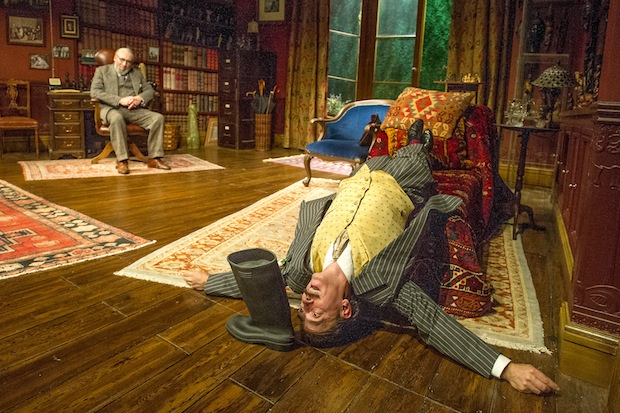Terry Johnson’s acclaimed farce Hysteria opens in Sigmund Freud’s Hampstead home in 1938. The godfather of psychobabble is ambushed by a beautiful maniac named Jessica, who forces him to analyse her, and then hides in his closet and strips naked. Along comes Freud’s old chum Yahuda, a bumbling twerp who doubles as the farce’s authority figure. His presence forces Freud to improvise countless daft wheezes in order to prevent Jessica from being discovered. You may wonder if Freud is the best candidate to star in this kind of sex caper. And you’d be right. He is, in fact, the worst candidate.
Having spent 40 years treating mental illness, Freud has only to open the closet door, and say, ‘Look, Yahuda, a deranged exhibitionist is hiding in my consulting room. Happens all the time. Put your clothes on, dear, and go home.’ Problem solved. Even if this explanation were untrue it would be convincing. But it is true. And yet Freud chooses to play the victim and to subordinate himself to Jessica’s manipulative hoax.
His false behaviour kills the comedy. Characters in a farce don’t cease to behave logically just because they’re in a farce. Their predicament should be so arranged as to make logical choices absurd. If Freud desired Jessica then his attempts to keep her hidden would be warranted, and funny. But his physical coldness to her is constantly stressed.
Salvador Dalí then arrives (not sure why), and runs around shrieking like an ambulance siren. His foaming megalomania prompts this aside, ‘I’ve never seen a more concise example of a Spaniard,’ which sounds like a caption from a Punch cartoon of around 1850. Freud, still acting with groundless stupidity, decides to pass Jessica off as Dalí’s Russian wife Gala. This being a farce, Yahuda becomes suspicious and asks Jessica where’s she’s from. And, this being a poor farce, Freud omits to say, ‘She’s from Russia,’ and instead stands behind Yahuda and mimes ‘Russia’ using an umbrella. Weak stuff. And all the weaker when you compare it with the classic from which it’s stolen, namely Fawlty Towers, and the scene where Basil mimes the name of a horse, ‘Dragonfly’, in order to get Polly to help him conceal his gambling from Sybil. That scene is genius. This is nowhere near.
Unmotivated absurdities pile up. Dalí, clobbered with a toilet seat, falls on his face unconscious. Freud resuscitates him by yanking Dalí’s buttocks upwards and crouching behind him on all fours. Enter Yahuda. He assumes from this tableau that Freud is sodomising Dalí. Which is hilarious to anyone who also believes Freud learned at medical school that the best remedy for unconsciousness is to place the victim in the buggery position.
Oddly enough, there’s a secondary play appended to the clumsy slapstick, which examines the possibility that Freud doctored his case notes in order to suppress his sexual feelings. This theme is full of interest and suspense, and Johnson handles it with great dramatic skill but it forms barely one fifth of the whole. Fused together, the farce and the melodrama are as incongruous as a giraffe laying bricks. Peculiar choices have been made in the audition room. Poor old Antony Sher (Freud) is quite a good actor but he keeps being cast in comic roles because he’s squat, stout, bald and has a silly face. This is unfair. Let him do serious work. The producers have punted a big pile of dosh on this pony. The second act includes a dream sequence requiring five extra actors and a huge decorated apparatus hidden behind the main set. It’s a cripplingly expensive two minutes. Maybe RBS gave them a loan. I hope the wager pays off and some starry-eyed moneybags offers to cart the heap into town. The good news is that most of the critics who matter loved it.
Cheese by FanSHEN is a skit about the financial crisis. Set in a disused Oxford Street office, the play purports to be taking place during a farewell party. Spectators are invited to nibble cheese and sup wine. The action begins. Three sacked yuppies plunge themselves into a commercial venture involving cheese, which, for obscure reasons, has become rarer than gold. Various disjointed sketches follow and the play rapidly loses focus and momentum. Playwright Nikki Schreiber wants to ‘deconstruct’ (i.e., destroy) the customs of drama but she fails to grasp that these conventions are the instrument, and not the enemy, of theatrical communication. If you bash them around you make ugly parps instead of sweet harmonies.
The play’s highlight is a short Nigella spoof full of exquisite detail and sly, dextrous mockery. Is it worth the schlep just to see that? Not quite. But the actress responsible, Rachel Donovan, is an impressive comic talent.
Got something to add? Join the discussion and comment below.
Get 10 issues for just $10
Subscribe to The Spectator Australia today for the next 10 magazine issues, plus full online access, for just $10.
You might disagree with half of it, but you’ll enjoy reading all of it. Try your first month for free, then just $2 a week for the remainder of your first year.














Comments
Don't miss out
Join the conversation with other Spectator Australia readers. Subscribe to leave a comment.
SUBSCRIBEAlready a subscriber? Log in